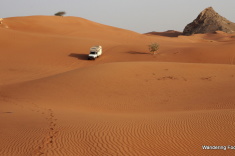This article is part of a mini-series called The Month of Eight Countries, which is about the countries Bruno and I will be visiting this month as part of our 4,000km overland transit between Turkey and France. The first article of the series was on Bulgaria.
I had never in my life entered a country so unprepared. I didn’t know which places we were going to visit, I hadn’t found a single campsite – heck, I didn’t even know the exchange rate!
We were only on our second country of the month, and already the flaws in our travel plan were starting to show. We’d sped through Bulgaria, packing in the tourism as much as possible, and hadn’t had the time to sit down and plan the next part of our route – Serbia – before actually departing on it.
To us (and to most, I expect), long-term travel equates to slow travel. When you go for a two-week holiday, you do all your planning beforehand. When you’re on the trip, one of the reasons you can maximize your tourism is that you’ve done the groundwork already. In long-term travel, travel research is being done continuously on the road. Anyone who’s ever planned a trip knows that the groundwork takes time.
.jpg)
This is the type of place from where good trip-planning gets done.
Bruno and I have a bit of a cycle to our travel. We’ll find a great place to stay for a few days, visit and tour (of course!), but also take advantage of our location to read up on the culture, history, and language, and to discuss and plan the next segment of our journey. Then, we embark on that next segment: we’ll travel to that next place, do the things we wanted to do there, read and relax some more, and plan the next part of the journey. Rinse and repeat ad infinitum…
Well, this month, we don’t have the rinsing cycle. We’re just washing, washing, and washing some more. And that is why we arrived in Serbia without any idea of where to go, what to do, or where to sleep. I like improvised travel, but this was a bit much.
Unfortunately, this lack of preparation set the tone for our four days in Serbia. From the Bulgarian border, we drove vaguely westward (toward a yet-faraway France), passing by some really very lovely countryside scenery. Men in hats and boots strolled along the road, hoes hoisted over their shoulders; couples in fields leaned over their plants, inspecting and discussing their progress; elderly women sat with granddaughters on porches munching on cherries and watching us drive past.
.jpg)
Scenes from the Serbian countryside.
.jpg)

We watched all this scenery go by, but we didn’t know where to stop and take part in it. We could have passed any number of wonderful places in Serbia by mere kilometers to our left or right, but we hadn’t a clue of their existence.
The Cyrillic script didn’t help things. Serbia is very proud of its culture and language, and very rarely writes words using Latin script. Most letters in the Cyrillic alphabet are identical in appearance to our letters, but often represent a different sound. For example, my name written in Cyrillic would look something like this: Бретане. You can almost make my name out if you squint your eyes just so.
The similarity of the Cyrillic alphabet kept making me think I could read the words on the signs, but it was, of course, in vain. The signs wouldn’t help lead us to hotels or villages with cool things to see. Slowly, the exoticism of the Cyrillic alphabet wore off. I didn’t have time to decode and unlock the script, and was left instead feeling frustrated and helpless.

How much of this writing do you actually understand?

In Bulgaria, they use Latin script too, just in case you didn’t get that this was McDonald’s…
And so, by the time we’d driven almost halfway through the country (this is less than 200km, as none of the Balkan countries are very big) and had opted to stop for the night in the parking lot of a petrol station, we hadn’t yet explored a single inch of Serbian soil on foot.
Thankfully, things changed the next day. Using the petrol station’s wifi, I quickly looked up a few of Wikitravel’s Serbia highlights, and saw that we would pass right by Vrnjačka Banja, one of Serbia’s most famous spa towns. So the next day, we drove there, parked the car, hopped out, and set out to explore. We wandered past a building dispensing spring water for drinking, another one a public bath. There were cute little spa hotels in renovated old buildings, a local market, and a long green park running parallel to a brook.
We walked along a pedestrian street lined with shops and cafés, stopping to have a look at the supposed original Bridge of Love (the more famous version is on the Seine in Paris, whereby lovers place locks onto the bridge and throw the key into the river as a symbol of their unbreakable love). We sat at a busy café for a drink and an ice cream, and watched the locals.

Cafe-lined pedestrian street in Vrnjačka Banja

Close-up of the Bridge of Love.
It was the first time I truly felt that I was now in Europe. It was evident that café culture – so much a part of my notion of Europe – was the lifeblood of this town. The cafés were packed with locals – women sharing a coffee and a cigarette over a bit of late-morning gossip, young men drinking a beer and a laugh, and older men sipping their coffees while browsing the day’s newspaper. This is what people do here, I understood. And since we were doing it too, I felt that I was finally connecting to Serbia.
But Vrnjačka Banja didn’t have a campsite, and the town was so compact that finding a parking space to camp for the night seemed more trouble than it was worth. And so, we drove on, past Orthodox churches and hillside monasteries, to Zlatibor, a town near Serbia’s western edge.

A typical Orthodox Church.

An Orthodox monastery tucked in the Serbian countryside.
Here, we finally found that decent campsite to spend those much-needed catch-up days. I still hadn’t read about the history of Serbia, and here we were near the border of Bosnia!
In between reading and research, Bruno and I visited the town and its surroundings, which is a ski post in the winter. We hiked up to a statue on a hill, which seemed to be the thing to do on a Sunday morning, despite the lackluster view. We wandered around the manmade lake and the new restaurants and shops built in the wooden A-frame style of the Alps. We chowed down on crêpes and waffles loaded with Nutella, and sat at another café to people-watch. I reflected.

Zlatibor’s manmade lake.

The statue at the top of the hill near Zlatibor.

Chowing down on a nutella-filled crêpe.

People-watching on a Sunday afternoon by Zlatibor’s lake.
I’d learned a few things about Serbia during our transit here. I’d deduced that it was richer than Bulgaria, because its houses were bigger and the cost of living was higher. I’d seen evidence of its crossroads-history in its café culture – its link to Europe – and its bakeries full of bahklava and burek – its connection to the Middle East. I’d noticed a lot of early-morning drinking along the road, and recognized the source of its problem when the cheapness of its beer (the only thing in Serbia that was as cheap as in Bulgaria) gave me a strange urge to drink by about noon.
But these things – this wisps of understanding – were so superficial. They were really nothing at all. One of the things I’ve come to love the most about travel is the experience of “unlocking” a country. What I mean by this is that at some moment after arriving in a new country, the things that were initially confusing and overwhelming – the language, the currency, the food, the culture – cease to be quite so confusing. Instead, they become intriguing as one’s grasp on the country becomes more firm, more confident. The process of discovery and growing understanding is one of the things I love most about travel. But with our Eight Countries’ Month transit to France, unlocking a country is impossible. We are simply moving too fast.
I’m sure that Serbia is a great country with a lot to offer the traveler. Unfortunately, I didn’t see Serbia’s greatness. I came too ill-prepared and without too little time to give.

I experienced most Serbian towns only from the window of Totoyaya – and so, did not do justice to the country.



Rcs - There is the song by Simon & Garfunkel that says “Slow down, you move too fast, You got to make the morning last, So kickin’ down the cobble stones, Look at the sun and feeling groovy.”
Take your time…
Brittany - Wise words for nomads and sedentary people alike. 🙂
Elizabeth - It is a shame that you lacked the time to grasp the essence of Serbia. I’m certain there are treasures to see and much to experience. The last photo of a Serbian town is lovely and with it you do give us a little taste of what it has to offer.
Brittany - You’re right, it is a shame. But I learned that, as a traveler I can’t always expect a country to unfold itself to me unless I’m willing to put in the work. That might mean prior research and preparation, or it might mean giving a country the time it deserves. Without one or the other, travel is left fairly meaningless. A good lesson to learn! 🙂
Lisa - Hi from Toronto…just read your latest blog. Thought I’d let you know that the famous bridge in Paris with all the locks was caving b/c of the locks so the wall of locks is now gone. Lovers will have to find a new place for their locks.
See you soon!
Love Lisa xoxoxox
Brittany - Thanks for filling me in. What a shame about the locks – such an icon of Paris! At least there’s an alternative in Serbia!